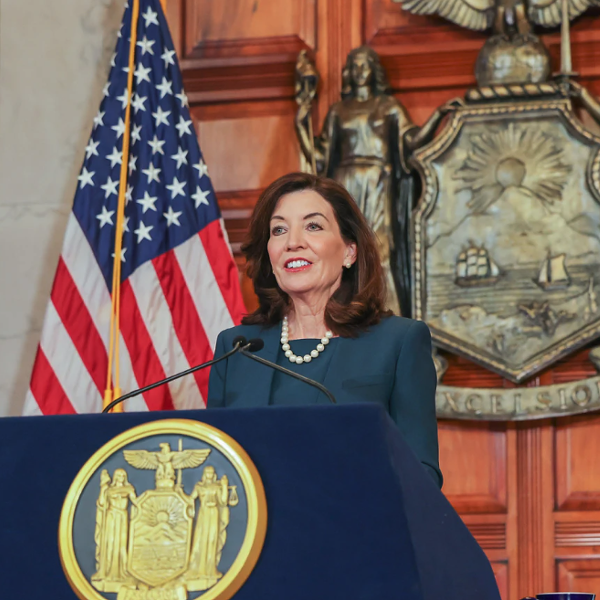Chuck Schumer was talking about Queens, but Newburgh was listening.
A new wind seemed to be in the air on Friday, when Schumer, the US Senate majority leader, appeared in Astoria to voice full-throated opposition to a proposed new gas peaker plant in the neighborhood. Flanked by progressive legislators and Democratic Socialists of America members, Schumer was in full cry. “I’ll lend my voice, my clout, and my muscle to stop this dastardly plant,” he vowed, sounding like a protagonist straight out of a Pete Seeger ballad.
Although framed as a community fight, the battle in Astoria is much larger. Schumer denounced the use of natural gas as a slightly cleaner bridge fuel toward clean energy, an idea that had broad support even among national environmentalists just a decade ago, but has since lost most of its luster.
“Clean gas” is an idea Danskammer Energy, a power plant operator hoping to rebuild its aging Newburgh plant as a slightly cleaner natural gas facility, desperately wants state and federal regulators to believe in. Since 2018, Danskammer has sought approval from the state Department of Environmental Conservation (DEC) and New York’s power siting board to carry out its expansion plans, against a rising outcry from climate activists and community members.
Less dramatic than Schumer’s use of the bully pulpit, but maybe more meaningful to Newburgh: The DEC recently released draft permits for Danskammer’s proposed new plant for the public to comment on as part of a permitting process called Article 10. The release was accompanied by an unusually frank note from the agency about the project’s incompatibility with the state’s new climate law: the Climate Leadership and Community Protection Act (CLCPA), passed in 2019.
“There are substantial greenhouse gas (GHG) emissions which are currently associated with the existing and proposed uses. Based on the information currently available, it appears that the proposed project would be inconsistent with or would interfere with the attainment of the Statewide GHG emission limits established in the Climate Act,” the agency wrote.
The CLCPA commits New York to building out an electrical grid entirely free of fossil fuels by 2040. It’s a rapidly approaching future, and there won’t be room for plants like Danskammer. The power producer claims to have a plan to switch to green hydrogen at some point in the future, but renewable energy advocates have denounced it as a pipe dream.
DEC commissioner Basil Seggos also took to Twitter on June 30 to throw cold water on Danskammer’s plans, writing that the company’s application materials “haven’t justified the projects or shown compliance with NY’s climate law.” Seggos also co-chairs the state’s Climate Action Council, a 22-member committee tasked with coming up with a “scoping plan” to guide progress toward state climate goals.
Weighing in on the project’s merits is an unusual step for an agency head to take in the middle of a review.
“I was really surprised. Usually they’re pretty silent on these things throughout the approval process,” says Eric Wood, Hudson Valley regional coordinator for the New York Public Research Interest Group. Wood’s group is part of a large coalition opposing the Danskammer project, along with the national Sierra Club and Food and Water Watch. Other groups opposed to the plant include longtime fixtures of the local environmental movement—Riverkeeper, Scenic Hudson, Catskill Mountainkeeper—and a slew of smaller community organizations, local businesses, and faith groups.
“We all are heartened to see the DEC question how dirty, fracked-gas power plants can comply with state climate law,” Wood says. “It’s truly a huge sign that our people-led movement against fossil fuel infrastructure—here in the Hudson Valley, in New York City, and across the state—is winning.”
Building Political Power
The Danskammer and Astoria gas-fueled power projects are drawing heavy criticism from climate activists, but increasingly, the opposition to projects like these goes far beyond the domain of traditional environmental organizations. Community organizing against fossil fuel power taps into a vein of rage about the damage wrought by power plants in the mostly low-income communities of color they sit in. Asthma rates are alarmingly high in the areas around the two plants: Newburgh’s rate of asthma visits to emergency rooms is more than twice the statewide level and three times that of surrounding Orange County, and respiratory disease in the neighborhood around NRG’s Astoria plant is so bad that the street next to the plant is nicknamed “Asthma Alley.”
Since Danskammer first proposed building a new plant in 2018, the project has been the focus of intense public interest. Online hearings held by the DEC in April to gather public input on the project lasted for nine hours. More than 10,000 comments about Danskammer’s application have already been submitted to the DEC, and with an August 29 deadline for the public to weigh in on the draft permits, there may yet be many more. A letter opposing the project has been signed by more than 150 state and local elected officials.
Notably absent from that letter: Officials in Danskammer’s own backyard. The Orange County legislature voted 12-7 in support of the project in 2019. Newburgh Town Supervisor Gil Piaquadio supports Danskammer’s expansion, as does Ulster County legislator Thomas Corcoran, Jr., whose district includes the nearby Marlboro school district. Danskammer currently pays the Marlboro district $1.2 million a year under a payment in lieu of taxes (PILOT) agreement. If the proposed expansion goes through, that payment will be boosted to $1.5 million, with annual increases over the next 20 years. Local unions are backing the project.
State Senator James Skoufis, a Democrat whose district includes Danskammer, has not publicly opposed the plant’s expansion, even as many of his colleagues in neighboring districts have weighed in against it.
Asked for a response to Seggos’s and Schumer’s recent comments on gas power’s incompatibility with meeting climate goals, Skoufis spokesperson Emma Fuentes stopped short of opposing the Danskammer project, but made it clear that any inability to operate in harmony with New York’s climate law should be a dealbreaker for the plant.
“Senator Skoufis served on his chamber’s workgroup that authored the CLCPA, the nation’s strongest climate change legislation,” Fuentes says. “The law is the law: any new project must show compliance with the CLCPA. If a project is noncompliant, it cannot proceed, simple as that.”
At the end of the day, the fate of Danskammer lies in Governor Andrew Cuomo’s administration, in how successful climate advocates can be at holding the state accountable, and in how committed the administration is to the painful process of developing real plans to meet its own climate goals. So far, the governor has talked a lot more about the general climate crisis facing New York State than about specific actions to blunt its impact.
“Governor Cuomo has the ultimate power here,” Wood says. “He appoints the DEC and many members of the siting board, which is overseeing the regulatory process of Danskammer. He can ultimately tell these people what to do.”
Lara Morales contributed to the reporting of this story.

















